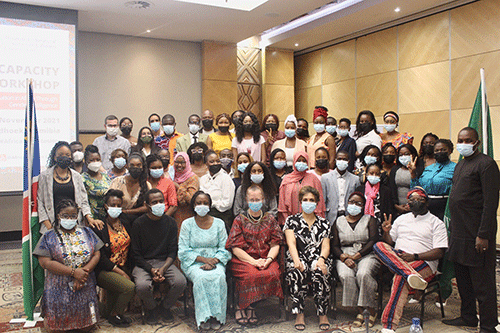Many girls on the African continent usually reach the ninth grade, but only one out of five complete the full spectrum of secondary education.
This owes to various factors such as pregnancy and/or being married off because of socio-economic reasons.
Pregnancies, whether voluntary, through rape or by incest, often cause girls to terminate their education, leaving them with very few options of establishing a good life for themselves and their children.
Rita Bissoonauth, head of mission of the African Union/International Centre for Girls’ and Women’s Education (AU/CIEFFA) in Africa thus feels it is important to advocate and talk about what happens and hinders a girl from going to
school.
“Why does she not complete the 12 years of schooling which is mandated; all our heads of state have ratified the AU policy in that regard, but mostly, this doesn’t happen,” she shared during the 4th Youth Capacity Building Workshop (YCBW) in Windhoek over the weekend.
Bissoonauth added that some parents have lost their jobs and many do not have money to feed their children, so many are married off as it means one mouth less to feed.
“When you are married off, it means you will fall pregnant. In most cases, these girls do not go back to school, and our countries need to make sure that the laws which allow girls to go back to school after dropping out are revisited.”
“It all comes down to gender norms and stereotypes which are some of the things which hinder the girl child from accessing school or completing it. These gender norms stem from years back and are still here in 2021,” she said.
Namibia, through the line ministry, has a temporary guideline stating that girls who fall pregnant should be allowed to return to normal schooling after spending at least a year with the baby. However, although the one-year absent rule is supposed to also apply to schoolboys who impregnate girls, schoolboys are rarely identified and older men seldom face any consequences, although a few schools have taken action.
Some girls, however, decide to drop out due to, among others, walking long distances to and from school, especially during the last three months of pregnancy; bullying from fellow learners; lack of financial support; no support from parents; no concentration in lessons; absenteeism; being shy in casual clothes; and not affording babies’ basic needs such as nappies and formula milk.
The youth constitute over 60% of Africa’s population, and Bissoonauth is adamant that they are the key stakeholders in ensuring that girls access education, stay in school and complete the mandatory 12 years of education.
She told Youth Corner learners will need support to continue with their education until the time of confinement and subsequently, while still ensuring the welfare and health of the newborn child.
Namibia’s education ministry executive director Edda Bohn said they are aware of the learner pregnancy and are reviewing the prevention and learner pregnancy policy.
“Learner pregnancy cases have risen within the adversities of the school closures. That is another area where we want to make education more responsive,” she said.
Statistics by the education ministry in Namibia earlier this year showed that approximately 3 627 learners have fallen pregnant in 2020, almost double the number in 2019. Of that number, about 3 323 schoolgirls fell pregnant during the March-July 2020 Covid-19 lockdown.
The YCBW programme was launched in 2017 and boasts of over 200 youth alumni championing girls and women’s education in Africa. This year’s cohort of participants is made up of 40 teachers and journalists, aligning with AU/CIEFFA’s Strategic Plan 2021 – 2025 which recognises teachers and journalists as key influencers in the promotion of girls’ education and retention of girls in school.


